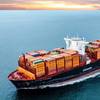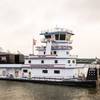A rise in sea traffic in Turkey's straits could strain what are already two of the world's busiest waterways, a government minister warned. The Bosphorus and Dardanelles straits, separating Asia and Europe, are the single outlet for the Black Sea and Caucasus states to transport oil and commodities to world markets.
"Currently, the straits are narrowly able to put up with the traffic level," State Minister Ramazan Mirzaoglu, in charge of maritime affairs, said. "But our study says a five percent rise in the number of ships carrying dangerous material would cause delays in passages of at least 23 hours," he said.
Turkey is concerned about the safety of some 12 million people living around the straits in Istanbul, its largest city, and Canakkale in the Dardanelles. The number of ships and amount of cargo began rising significantly in the 1990s after ex-Soviet nations started to play a bigger role in world trade.
Mirzaoglu said official research showed a 20 percent rise in the past three years in the transport of hazardous material such as oil and its derivatives through the waterways.
Delays would jump to more than four days from the current average of two hours if vessels carrying such cargoes rose 10 percent from a current annual level of 5,000 vessels, he said. More than 50,000 ships sail through the straits each year.
Turkey has opposed increased tanker traffic through the straits, saying that would pose an unacceptable environmental threat. Mirzaoglu said his ministry's research was based particularly on dangerous materials as ships carrying such cargoes were subject to tighter rules, but that affected all navigation. Under the 1936 Montreux Convention governing the straits, all vessels have the right of free passage in peace time and Turkey does not have power to limit volumes.
"This is not about being against or in favor of transporting oil through the straits. This is the result of research that shows the recent situation and danger of environmental disasters as well as large loss of life," he said.
Subscribe for
Maritime Reporter E-News
Maritime Reporter E-News is the maritime industry's largest circulation and most authoritative ENews Service, delivered to your Email five times per week









